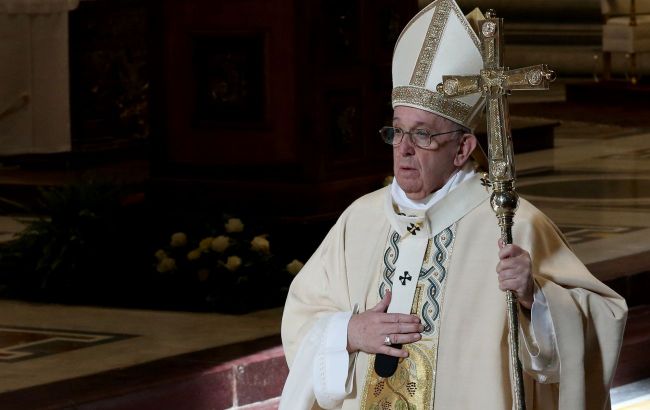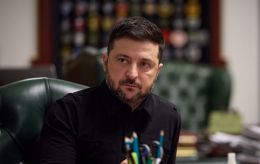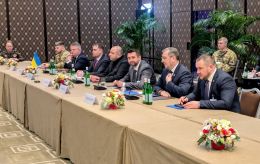Pope Francis dies: Who can become next pontiff?
 Photo: Pope Francis has died (Getty Images)
Photo: Pope Francis has died (Getty Images)
On Monday, April 21, 2025, Pope Francis passed away at the age of 88. His death marked the end of a 12-year pontificate known for its commitment to reforms, openness, and protection of the marginalized.
RBC-Ukraine reports on what happens after the death of the Pope and who might become the next pontiff.
What happens after death of Pope
After the death of the Pope, a period known as sede vacante - the vacant seat - begins in the Catholic Church. During this time, the College of Cardinals assumes control of Vatican affairs and convenes a conclave - a special gathering where a new pontiff is elected.
In 2025, there are 138 cardinals under the age of 80 eligible to vote. Although under canon law any baptized and unmarried Catholic man may become Pope, in practice since 1378, only cardinals have been elected to the papacy.
Cardinals are Roman bishops who serve as the closest advisers to the Pope and hold key positions in the Roman Curia - the supreme executive body of the Catholic Church. They also form the College of Cardinals, which governs the Church during the transitional period and directly participates in the election of a new Pope.
In total, there are 253 Roman bishop-cardinals worldwide. However, only 138 of them have the right to vote in the conclave, due to an age restriction - up to 80 years old.
Possible successors to Pope Francis
Among the current potential candidates for the papal throne are:
Cardinal Pietro Parolin (Italy, 70 years old). Vatican Secretary of State since 2013, known for his diplomatic work, including negotiations with China. Considered a moderate candidate capable of continuing Pope Francis' course. In 2024, he visited Ukraine and discussed with President Volodymyr Zelenskyy the exchange of prisoners of war and the return of the bodies of fallen Ukrainian defenders.
Cardinal Luis Antonio Tagle (Philippines, 67 years old). A progressive voice in the Church, known for his support of inclusivity, including toward the LGBT community and divorced Catholics. Could become the first Pope from Asia.
Cardinal Matteo Zuppi (Italy, 69 years old). President of the Italian Episcopal Conference, known for his peacekeeping efforts, particularly in Ukraine. Considered close to Pope Francis.
Cardinal Fridolin Ambongo Besungu (DR Congo, 65 years old). Known for his active stance on social justice and human rights. Gained prominence for his position on the Vatican's doctrine regarding the blessing of unmarried and same-sex couples. His election could underscore Africa's growing role in the Catholic Church.
Cardinal Péter Erdő (Hungary, 72 years old). A conservative candidate, known for his traditional views on Church teachings and immigration policy.
Cardinal Wim Eijk (Netherlands, 71 years old). Received the title of cardinal in 2012 from Pope Benedict XVI. Known for his critical views on Pope Francis' decisions, particularly regarding family issues and the sacrament of Communion for divorced individuals. He supports traditional values and opposes the blessing of same-sex couples.
Cardinal Raymond Burke (USA, 76 years old). Known as a leading arch-conservative in the Church, a proponent of the Latin Mass, and a public critic of Pope Francis’ liberal tendencies. Opposed allowing divorced and remarried couples to receive the Eucharist and criticized the Vatican's new stance on contraception and civil marriages.
Cardinal Mario Grech (Malta, 67 years old). A cardinal since 2020, considered a potential moderate successor to Pope Francis. Advocates for inclusivity and the importance of supporting those marginalized by the Church due to their sexuality or family status.
What precedes death of Pope Francis
RBC-Ukraine reported that the death of Pope Francis resulted from a serious illness that began back in February this year. The pontiff was hospitalized on February 14 due to breathing difficulties and was later diagnosed with bilateral pneumonia and a respiratory crisis. He underwent blood transfusions and oxygen therapy.
Throughout his 12 years on the papal throne, Francis repeatedly faced health problems, particularly due to lung conditions, as he had suffered from pleurisy in his youth and had part of a lung removed. According to sources in the Vatican, the Pope expressed fears that this time he might not recover.
On the eve of Easter, April 16, the Vatican announced that Pope Francis would be unable to conduct the main Easter services due to his health condition. On Easter, April 20, Francis appeared before the faithful for the first time since his illness, where he called for peace in Ukraine and Gaza. On the same day, he met with US Vice President JD Vance, exchanging Easter greetings.
Sources: New York Post, Politico, and The Independent.

